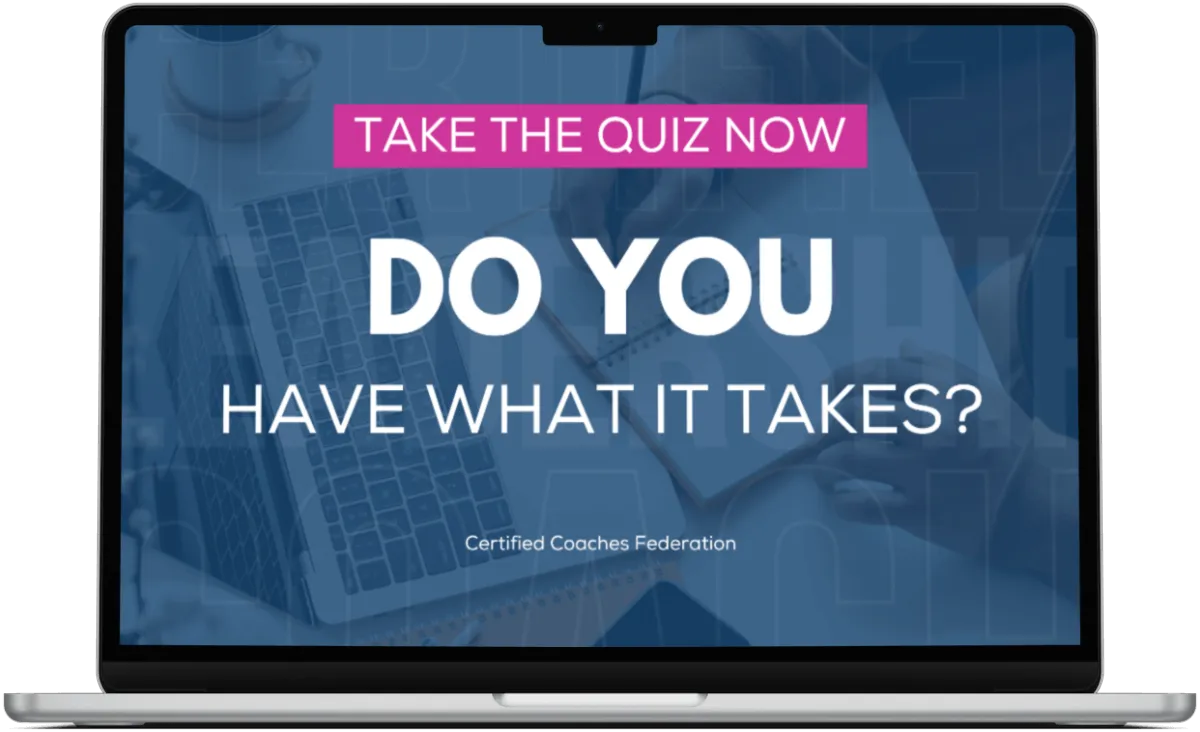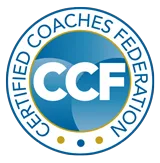Blog
Your Coaching Compass:
Navigating Success Together
Every story, every insight, every tip is curated with one goal: to guide you towards coaching success and personal fulfillment.
Receive weekly newsletter by signing up below:

Blog
Your Coaching Compass:
Navigating Success Together
Every story, every insight, every tip is curated with one goal: to guide you towards coaching success and personal fulfillment.
Receive weekly newsletter by signing up below:

FREE QUIZ
Do You Have What It Takes To Become A Life Coach?
Find out now by taking our Coaching Profile Quiz! Takes less than a minute to get your results.


The Discovery Call – What Is It?
The Discovery Call - what is it?
Butterflies and sweet thoughts are the best feelings when you’re in a discovery phase. Those first moments when you feel like you can do anything together. Long walks, unending calls, endless discussions - great time spent together - it all begins somewhere.
Wait, what are we talking about here? Well, we wanted to talk about how a relationship between a coach and their client starts, but somehow, we compared it to an actual relationship. Now that we think about it, it’s not even wrong. The first few dates between a coach and a client are the nitty-gritty of the discovery phase.
And since we’ve started talking about the discovery phase, let’s see how it all starts - with the discovery call! What is that, how can it help you, and what technical details should you know going in on a Discovery Call - we’ll be talking about everything in today’s article.
Around the end of the article, we’ll be serving you with a fresh plate of questions that you should ask when you’re having your discovery call with a potential client and some fresh tips on where you can get new opportunities for your discovery call. Let’s get into it, shall we?
What is the Discovery Call?

The Discovery Call is the first meeting between a coach and a potential client. Its main purpose is to get to know your potential client and hear them out regarding their goals, and frustrations. In general, the discovery call is offered for free. The discovery call’s idea for a coach is to get a good reputation and build a strong relationship with a client from the get-go.
The discovery call will be of great help for you, as you’ll learn more about your client and they’ll learn how the collaboration will flow.
The discovery call is required by most clients because let’s face it - who would want to part with hundreds or thousands of dollars if they don’t at least know what they’re getting in return? Thus, you offer them a sample of how coaching works.
Most of the clients will really feel the discovery call and continue working with you. Some of them won’t, and that’s fine - just make sure you ask them for feedback because you should know why people don’t see you as option A.
How does the discovery call help you get more clients?
We already mentioned that Discovery Calls help you get more clients, but how does that happen? Well, there are two ways in which a Discovery Call helps you get clients.
First, you seal the deal with the potential client that is in front of you at that very moment. Marketing taught us that we’re entitled to a freebie most of the time - e-books, discount codes, etc. Thus, that freebie, in your client’s mind, is necessary at first.
Secondly, if the Discovery Call goes well, your clients will probably send word to their family and friends about how thrilled they are to start coaching. At one point, they’ll ask: Who is your coach? - at which your name will pop out in the discussion.
How long should a discovery call be?

Considering it’s taking your time and, at the end of the day, time means money, how much time are you willing to spend on a free call? Well, it depends.
First, think about the service you’re selling. If your coaching package is around the hundred mark, the discovery call shouldn’t be longer than half an hour tops. Of course, if you’re selling packages worth tens of thousands of dollars, maybe your discovery call will go for approximately one hour.
Also, take into account the feeling you have from the person in front of you. If it’s the right one, go for as long as you feel like it. You decide.
What should you talk about in a Discovery Call?
The Discovery Talk is really important for both coach and client alike. Coaches will get to know the client, their goals, motivations and what sets them back a few steps.
Also, the client should want to talk about all of the above. Of course, you won’t be able to go very much into detail, but you’ll still be able to express what you desire to get out of coaching.
How much should a Discovery Call cost?
We already answered this question, but we reiterate our opinion because we want you to understand how much emphasis you should put on this.
The Discovery call should be free. At least the first six months of constant calls, until you find your regular clientele, you need to strive for as many great clients as you possibly can get.
If you really want to receive payment for a Discovery Call, make sure the price point is affordable for anyone in your target audience.
What questions should you ask in a Discovery Call?

Now, let’s get to the important part of the Discovery Call - what questions should you ask in a Discovery Call?
Tell me more about yourself
The first question you’ll have to ask is - tell me more about yourself. This question keeps it very open, so your client should share lots of information.
Through this question, you start building rapport with your client. In order to maintain that, make sure you convey that you’re actually listening to them. If they get the sense you’re distracted, the rapport you started building will very quickly fade away.
What would you like to accomplish by this time next year?
After the first question, you already know some background info about your potential client. Now, this question is very strong but has to be asked.
This question is phrased in such a way as to place the power back to them, letting them know that they can reimagine themselves.
Their answer could be: I like to be so much further ahead than where I’m at right now. Or, of course, they could say: I like to change a tad bit of my life, but not too much.
Also, they could set different accomplishments for different aspects of their life: financial, business, health - whatever works for your client.
How long have you wanted to accomplish these goals?

This question is specifically meant to push some pain buttons inside the head of your possible client. You need to create some sort of cognitive dissonance or mental distress, by which they will actually remember how long they have thought about these goals.
Don’t panic if this causes a little bit of stress in them - that’s normal. We want them to understand the reality of “no pain, no gain”.
How will your life change after accomplishing these goals?
Oh, we’re going down the path of the emotional roller-coaster, aren’t we? Going from stress to accomplishment in a 2-question series can be a lot to digest, but that’s alright - if they are going to make it, then they’re the right clients!
This question keeps the answer pretty broad because change does not mean it will necessarily be good or bad. Keeping it neutral gives the power back to your client and they’ll be able to discern if the change will be good or bad.
The answer, mostly, will be in the spectrum of Oh, my life will change SO much after I’ll accomplish these goals. That’s what we want to hear out of our client in the first 10-15 minutes of our conversation - positivity and seeing the big picture.
How would you feel if a year goes by and you haven’t achieved these goals?
Let’s bring them down again, but just for a little while. This question is powerful and again pinpoints the pain of your client - if you fail, what happens?
We need to ask this question because our client needs to think about this situation and make sure that they understand the fact that they can’t have everything they wish for from the start.
What steps have you taken so far?
This question is directly linked to the one before because you have to see what steps have been taken by your client already. If the answer is none, well, the disaster of not accomplishing their goal should not surprise them that much.
Also, we want to see, if there were already steps taken, what has worked and what hasn’t. Let’s say your client has a weight loss goal and tried keto, paleo, and intermittent fasting - but nothing worked out. Well, you can start off with that in mind and not suggest any of those diets - maybe just a regular, balanced diet will work for them - with exercise on the side.
What are some of the obstacles you’ve encountered?
If they have taken steps, they probably encountered some obstacles along the way. That’s why we ask this question - making sure that we know what obstacles have been encountered up until this point.
Building rapport with your client starts early and starts through vulnerability - so try and do that and see how well you’ll fair with it!
How can I help?

Now, by this time, maybe this question was already asked, but it does help to mention it. When you’ll ask this question, you’ll transfer the power back to the client. They will be able to answer exactly how can they be helped by you, your skills, abilities, and expertise.
Here, you’ll have to lead the way. Make sure you explain to them what a coaching session will look like. Envision with them how will their life change while being coached. Tell them about the frequency, and the types of coaching sessions (group session, private session, special session) they’ll have to attend.
Give them these details, so they know from the start what they’re getting into.
What questions do you have for me?
By this point, they’ve probably asked some questions already, but make sure that you pop in with this question around the end of the discovery call. Give them the opportunity to ask ahead any question they have right now.
Do you believe I can help you achieve your goal sooner or easier?
This question is important, because after a 30-40 minute discussion where your client was vulnerable and you decided that you can help them, now you’ll see if they can really be helped or not.
Let them decide if collaborating with you will really spark the power in them. If you’re a great salesperson of yourself, you should’ve convinced them, by now, that the answer to the question above is yes.
How can we work together?
The final question is, again, empowering the client. You ask them, directly, how you can work together. By now, they probably know a part of your packages - make sure you present them with transparency.
If you can get the client excited after a 30-40 minute call, they will be open for collaboration right at that very moment. Get the deal in the bag - don’t wait for it.
How do you get new discovery calls?

Discovery calls are necessary in order to get new clients, but how do you get new discovery calls? At first, you should start with friends, but once the pool of friends is depleted, how are you going to get new leads?
Website
For starters, create a website. Even though social media is great exposure, you won’t control the algorithm. At one point, people will just stop seeing your posts. That’s why a website is important - because you can keep all the valuable information in a single spot.
Other than that, you can present yourself and your packages in a more professional way. Also, you can streamline your customer’s experience and offer them a chance to book the discovery call really easily.
Social Media
Even though you’re not in control of your social media profiles, you should still be there - 100%. When thinking about going on social media, make sure you keep in mind your target audience. If it’s over 40 years old, maybe Facebook is your best bet. If you’re going to coach students, TikTok and Snapchat can bring some great exposure!
Get the word out!
Don’t be afraid to get the word out on the street that you’re offering these discovery calls. If you want to get the word out faster, ask your friends if they can share your posts or recommend you some people who you can contact about having a short discovery call.
Let people know that the Discovery Call is free
Right from the start, make sure you put an emphasis on the fact that the Discovery Call is free - otherwise, they may be scared about the fact that they have to pay for something they don’t know.
Where should you have your Discovery Call?
The Discovery Call should take minimum effort from both your possible client and yourself. That’s why we recommend having those on Zoom or other platforms like Zoom. This way, you can coach people from around the globe!
Even if you’re in the same city as your potential client, you may want to keep the discovery call online, as traffic is quite a big stress inducer. You don’t want to have a discovery call after you’ve been stuck in a traffic jam for the past fifty minutes.
Conclusion
In conclusion, discovery calls are a necessity in every coach-client relationship. The start is really important, so make sure you get on with it in the most professional way you imagine.
certifications / TRAININGS
certifications / TRAININGS
CERTIFIED COACHES FEDERATION | TERMS OF USE | PRIVACY POLICY
